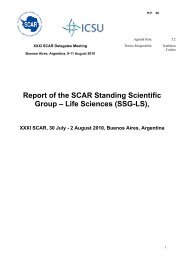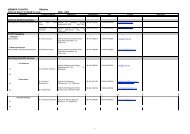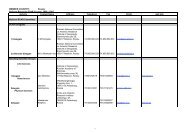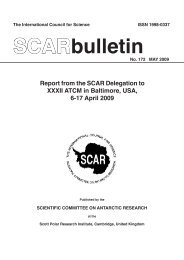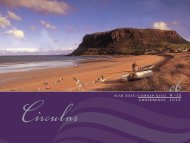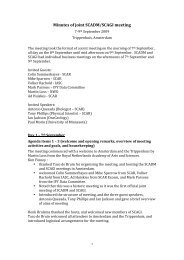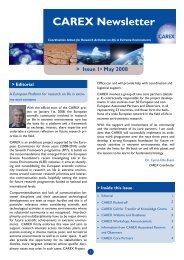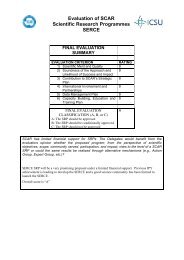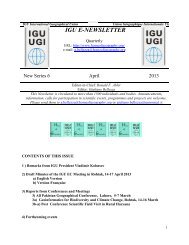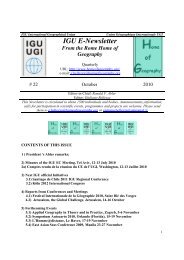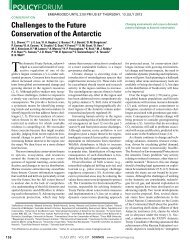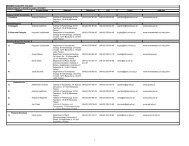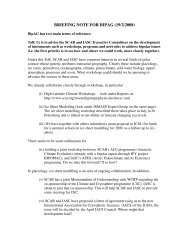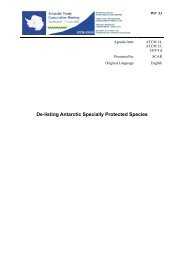standing scientific group on geosciences - Scientific Committee on ...
standing scientific group on geosciences - Scientific Committee on ...
standing scientific group on geosciences - Scientific Committee on ...
You also want an ePaper? Increase the reach of your titles
YUMPU automatically turns print PDFs into web optimized ePapers that Google loves.
XXVIII SCAR Delegates Agenda 4.3 Paper 14<br />
Recommends that Nati<strong>on</strong>al <strong>Committee</strong>s, where possible, place l<strong>on</strong>g-term GPS observatories<br />
<strong>on</strong> remote bedrock features (as identified by the SCAR ANTEC <str<strong>on</strong>g>group</str<strong>on</strong>g> –<br />
www.antec.scar.org/proposed_gps.htm) to provide informati<strong>on</strong> <strong>on</strong> the current tect<strong>on</strong>ic<br />
moti<strong>on</strong> of the Antarctic plate.<br />
6. King George Island Geographic Informati<strong>on</strong> System<br />
Noting the SCAR recommendati<strong>on</strong> XXVI-6 c<strong>on</strong>cerning rati<strong>on</strong>alizati<strong>on</strong> of <str<strong>on</strong>g>scientific</str<strong>on</strong>g> activities<br />
<strong>on</strong> King George Island the Geospatial Informati<strong>on</strong> Group of Experts<br />
Recognising that a Geographic Informati<strong>on</strong> System for the whole island has been produced<br />
and is now available <strong>on</strong> the internet<br />
Recommends that countries with program activities <strong>on</strong> King George Island should make use<br />
of this integrated system for science activity, envir<strong>on</strong>mental planning and logistic<br />
operati<strong>on</strong>s.<br />
And further recommends that Nati<strong>on</strong>al <strong>Committee</strong>s, through their Nati<strong>on</strong>al Programmes,<br />
c<strong>on</strong>tinue providing spatially referenced data to the GIS for the mutual benefit of all<br />
Nati<strong>on</strong>al Programmes with activities <strong>on</strong> the island.<br />
New Recommendati<strong>on</strong><br />
C<strong>on</strong>cerning Geographic Informati<strong>on</strong> c<strong>on</strong>tact officers<br />
Background<br />
Recent studies of spatial informati<strong>on</strong> stored in SCAR data bases, in particular the SCAR<br />
Composite Gazetteer of Antarctica have highlighted problems with the integrity of that data.<br />
In particular, coordinates for some named places vary between nati<strong>on</strong>al gazetteers. This has<br />
happened for a variety of reas<strong>on</strong>s that do not reflect <strong>on</strong> the competence of those resp<strong>on</strong>sible<br />
for the data but rather reflect such factors as:<br />
1. Changes in surveying techniques which go from historical times to present<br />
2. Loss of metadata such as, which geodetic reference system was used during the<br />
original mapping of a feature.<br />
3. Changes in the features themselves. For example, a named nunatak may now be part<br />
of a ridge because of ice recessi<strong>on</strong>, or streams have migrated across their floodplain.<br />
4. Lack of clarity in the original feature descripti<strong>on</strong>.<br />
This problem has important practical implicati<strong>on</strong>s. Some Antarctic Specially Protected Areas<br />
are defined about a topographic feature. If there are several sets of coordinates for the feature,<br />
management of the area becomes impossible. Computer access and processing of <str<strong>on</strong>g>scientific</str<strong>on</strong>g><br />
data attached to a named feature can be compromised, and search and rescue can be hindered<br />
if search parties have several different coordinate opti<strong>on</strong>s for the same feature to choose<br />
from.<br />
This problem should be rectified during re-mapping activities and requires internati<strong>on</strong>al<br />
liais<strong>on</strong> between resp<strong>on</strong>sible geographic informati<strong>on</strong> specialists. Not every SCAR nati<strong>on</strong> has a<br />
designated Geographic Informati<strong>on</strong> c<strong>on</strong>tact pers<strong>on</strong>, therefore hindering the resoluti<strong>on</strong> of this<br />
problem and other spatial data issues.<br />
Thus the Geoscience Standing <strong>Scientific</strong> Group puts forward the following recommendati<strong>on</strong>:<br />
Page 14 of 49



